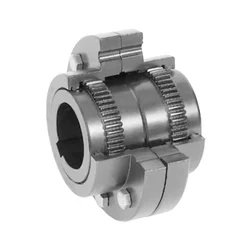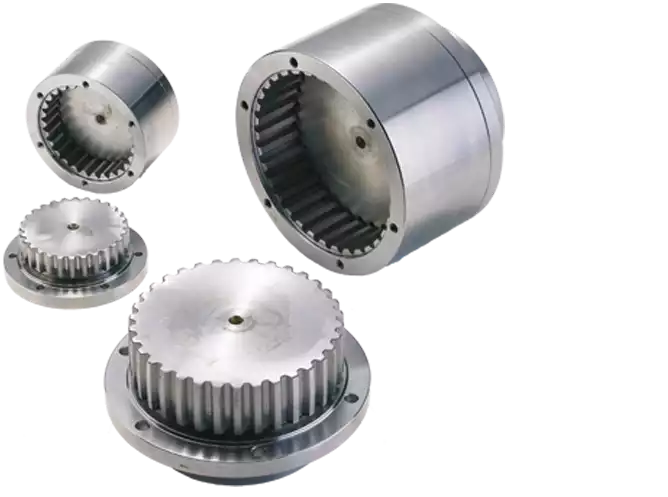Product Description
High-speed rail couplings
The Gear Transmission Division covers an area of more than 80,000 square meters. It has more than 350 sets of various equipment, including machining centers, turning centers, CNC lathes, precision grinding machines (CNC), CNC profile grinding machines, gear testing machines, three-coordinate testing machines, gearbox comprehensive performance test benches, well carburising furnaces, multi-purpose furnaces, nitriding furnaces, induction machines, quenching and pressing machines, etc. With a full range of equipment and a wide processing range, our company has ability to process and test internal and external gears with an external diameter of up to φ2500mm, a module of up to 45mm and an accuracy of up to AGMA 14-13 grade or DIN 3962 grade 3-4, forming an annual production capacity of nearly 60,000 gears and more than 15,000 sets of gearboxes. It has established a first-class domestic and world advanced gear transmission system industrialization base.
4400 Slave gear Mechanical drive gear HXD1C Traction gear
Detailed Photos
Company Profile
CHINAMFG Xihu (West Lake) Dis. Institute Co.,Ltd is a state-own company affiliated with CHINAMFG group. Found in 1959, it locates in HangZhou city in the great ZheJiang region.Focus on R&D of critical equipment for China railway industry, it is a specialized research institution for new material and processes for locomotive and rolling stocks, as well as a high-tech manufacturer of critical parts and components for railway transportation.Currently, it has about 3,000 employees working in 6 production sites, its revenue exceeded 700 million USD in 2571.
Rail transit equipment, automobiles and new energy vehicles, ships and marine engineering equipment, aerospace vehicles, energy-saving and environmental protection equipment, wind power generation equipment, mining machinery, robot parts, construction machinery, mechanical and electrical equipment, transmission devices, instrumentation, electronic appliances, plastics R&D, design, manufacture, sales, repair, leasing, and technical services of products, metal products and parts; Mold manufacturing, sales, repair, and technical services; Metal casting, forging, and welding; Surface treatment and heat treatment; Orbital welding Engineering construction; Product testing and testing; Professional technical and operational skills training (excluding vocational certificate training recognized by the state), technical and management consulting, conference services; Rental of self-owned houses and equipment; Self-operated and agency of various commodities and technology import and export business (except for goods and technologies that are restricted by the state or prohibited from import and export); Design and produce print advertisements, and use the company’s public publications to publish domestic advertisements.
Certifications
FAQ
1. How long is the product warranty period?
A: Two years.
2, how to place an order to our company?
A: After the products you need are confirmed by both parties, our company will CHINAMFG a contract with you, and we will execute the delivery and other related matters according to the contract terms.
3. How to distribute the product?
A: We generally provide FOB prices, and the freight is borne by the buyer. If the buyer has the demand, we can also provide CIF price, our company is responsible for shipping products.
4. Settlement currency?
A: We can settle in RMB, USD and Euro.
5. Return policy?
A: In case of any problem with the product, the 2 parties shall negotiate a return or exchange according to the terms and conditions of the contract.
6. After-sales problems?
A: If there is a quality problem during the warranty period, our company will answer it to the customer within 24 hours. If the problem is more serious, our company will arrive at the customer site within a week to answer it. Products beyond the warranty period we provide maintenance services, provide paid replacement parts, provide paid customer on-site service.
7, how to buy the fragile and consumable parts in the product?
A: Our company will make a list of vulnerable and consumable parts and provide channels for purchase.
/* January 22, 2571 19:08:37 */!function(){function s(e,r){var a,o={};try{e&&e.split(“,”).forEach(function(e,t){e&&(a=e.match(/(.*?):(.*)$/))&&1

Capability of Tooth Couplings to Handle Torque and Angular Displacement
Yes, tooth couplings are designed to withstand high levels of torque and angular displacement. These couplings are capable of transmitting significant amounts of torque between shafts while accommodating angular misalignment. The teeth on the coupling’s hubs engage with each other, providing a secure connection that can transmit torque efficiently.
Angular displacement, also known as misalignment, occurs when the connected shafts are not perfectly aligned. Tooth couplings can accommodate a certain degree of angular misalignment without compromising their performance. The design of the teeth allows for a degree of flexibility, which helps in compensating for minor misalignments that may occur due to various factors.
However, it’s important to note that tooth couplings have their limits in terms of torque capacity and misalignment compensation. Excessive torque beyond the coupling’s rated capacity or severe angular misalignment can lead to premature wear, damage, or even coupling failure. Engineers should carefully consider the coupling’s specifications, application requirements, and operating conditions to ensure proper performance and longevity.

Specialized Maintenance Practices for Longevity of Tooth Couplings
To ensure the longevity of tooth couplings, specialized maintenance practices should be followed:
- Lubrication: Proper lubrication is crucial to reduce friction and wear between the teeth. Use lubricants recommended by the coupling manufacturer and ensure regular lubrication.
- Lubricant Quality: Use high-quality lubricants with suitable viscosity and additives for optimal performance and protection against corrosion.
- Lubrication Frequency: Follow the manufacturer’s recommendations for lubrication intervals. Factors such as operating conditions and environment can influence the frequency.
- Alignment: Maintain proper alignment of connected shafts to prevent excessive load and wear on the teeth. Misalignment can lead to premature failure.
- Inspection: Regularly inspect tooth couplings for signs of wear, damage, or misalignment. Early detection allows for timely repairs or replacements.
- Torque Monitoring: Monitor transmitted torque to ensure it remains within the coupling’s rated capacity. Excessive torque can lead to overloading and damage.
- Temperature: Monitor coupling temperature during operation. Elevated temperatures could indicate problems like inadequate lubrication or misalignment.
- Vibration Analysis: Use vibration analysis tools to detect abnormal vibrations that may indicate coupling issues or misalignment.
- Professional Inspection: Periodically have a professional inspect and assess the condition of the tooth coupling. They can identify potential issues that might go unnoticed.
- Replace Worn Parts: If wear or damage is detected, replace worn components promptly to prevent further deterioration.
- Manufacturer Guidelines: Adhere to the manufacturer’s maintenance recommendations and guidelines for the specific tooth coupling model.
Following these specialized maintenance practices can help ensure the reliable operation and extended lifespan of tooth couplings in machinery systems.

Types of Tooth Couplings for Specific Uses
There are various types of tooth couplings designed to cater to specific application requirements:
- Spur Tooth Couplings: These are the most common type, with straight teeth that transmit torque and handle misalignment.
- Helical Tooth Couplings: Helical teeth reduce noise, vibrations, and backlash while providing smooth torque transmission.
- Bevel Tooth Couplings: Ideal for applications where shafts intersect at an angle, such as in right-angle drives.
- Internal Tooth Couplings: Suitable for applications where space is limited and torque needs to be transmitted through the inside of the coupling.
- Sliding Tooth Couplings: These allow axial movement between shafts while transmitting torque, making them useful in applications with varying distances.
- Flexible Tooth Couplings: These accommodate misalignment and dampen vibrations, commonly used in pumps, compressors, and turbines.
The choice of tooth coupling type depends on factors like torque requirements, misalignment, space constraints, and specific application demands.


editor by CX 2024-03-26
by
Tags:
Leave a Reply